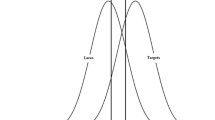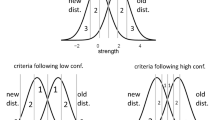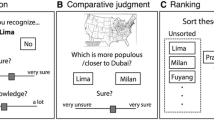Summary
Three dependent variables were derived from an extended Signal-Detection paradigm: memory performance, confidence level, and response-bias. In the assessment of memory items, S and 2 confederates were exposed periodically to fictitious results which implied inferiority or superiority of S. Memory performance was generally better in group situations than when the subject was alone. Within groups, inferiority motivated S to improve. Significant confidence differences between correct and false judgments and, if S judged falsely, a high susceptibility to cognitions about S's relative performance, led theoretically to a distinction between internal and external cues and to the assumption that S wished to avoid uncertainty. Response-bias was found to be independent of motivation and very close to expected stimulus occurrence. The reward/cost theory of Thibaut and Kelley accounts for the motivation engendered and is linked to some theoretical considerations about processing objectively classifiable stimuli in social context.
Zusammenfassung
Aus einem erweiterten Signal-Detection-Paradigma wurden 3 abhängige Variablen abgeleitet: Gedächtnisleistung, Sicherheitsniveau und Response-bias. Bei der Beurteilung von Gedächtnisaufgaben wurden einer Vp und 2 Mitwissern des Vl von Zeit zu Zeit fiktive Ergebnisse gezeigt, die entweder Unterlegenheit oder Überlegenheit der Vp induzierten. Verglichen mit einer Alleinsituation stieg die Gedächtnisleistung allgemein in Gruppensituationen. Innerhalb von Gruppensituationen wurde die Vp durch Unterlegenheit motiviert, sich zu verbessern. Signifikante Unterschiede in der Sicherheit zwischen richtigen und falschen Urteilen und hohe Beeinflußbarkeit durch Kognitionen über den relativen Leistungsstand der Vp bei Fehlerurteilen führte theoretisch zu einer Unterscheidung zwischen innerem und äußerem Aufschluß und zu der Annahme, daß die Vp Unsicherheit vermeiden will. Der gefundene Response-bias war unabhängig von Motivation und sehr nahe bei der Wahrscheinlichkeit des Auftretens der Reize. Die reward/cost Theorie von Thibaut und Kelley kann die erzeugte Motivation erklären und wird mit einigen theoretischen Überlegungen über die Verarbeitung objektiv definierbarer Reize im sozialen Kontext verknüpft.
Similar content being viewed by others
References
Banks, W. P.: Signal detection theory and human memory. Psychol. Bull. 74, 81–99 (1970).
Egan, J. P.: Recognition memory and the operating characteristic. Indiana University: Hearing and Communication Laboratory. Technical Note AFCRC-TN-58-51 (1968).
Feather, N. T.: Change in confidence following success and failure as a predictor of subsequent performance. J. Pers. soc. Psychol. 9, 38–46 (1968).
Green, D. M., Swets, J. A.: Signal detection and psychophysics. New York: Wiley 1966.
Massey-Dickinson Company Inc.: MD General equipment catalog 100. 9–11 Elen Street, Saxonville, Mass. 01701, USA.
Swets, J. A., Sewall, S. T.: Invariance of signal detectability over stages of practice and level of motivation. J. exp. Psychol. 66, 120–126 (1963).
Thibaut, J. W., Kelley, H. H.: The social psychology of groups. New York: Wiley 1959.
Upmeyer, A.: Social perception and signal detectability theory: group influence on discrimination and usage of scale. Psychol. Forsch. 34, 283–294 (1971).
Author information
Authors and Affiliations
Additional information
This research was supported by research grants from the “Deutsche Forschungsgemeinschaft” allotted to the “Sonderforschungsbereich 24” at the University of Mannheim, West Germany. We are grateful to Mary Madden, Pauline Sadler, and Jennifer S. Sentance for their cooperation on the English translation.
This article is partly based on a Diplom-thesis by the second author entitled “Effekte von Überlegenheit und Unterlegenheit in Gruppen auf Gedächtnisleistung und Skalengebrauch”.
Rights and permissions
About this article
Cite this article
Upmeyer, A., Layer, H. Effects of inferiority and superiority in groups on recognition memory and confidence. Psychol. Forsch. 35, 277–290 (1972). https://doi.org/10.1007/BF00424551
Received:
Issue Date:
DOI: https://doi.org/10.1007/BF00424551




